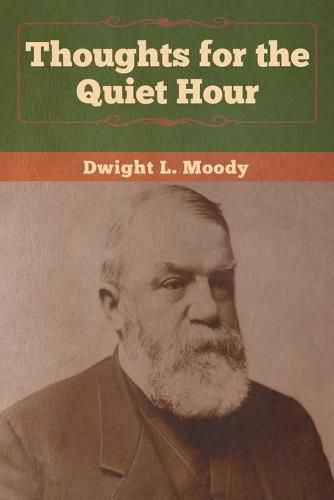Readings Newsletter
Become a Readings Member to make your shopping experience even easier.
Sign in or sign up for free!
You’re not far away from qualifying for FREE standard shipping within Australia
You’ve qualified for FREE standard shipping within Australia
The cart is loading…






This title is printed to order. This book may have been self-published. If so, we cannot guarantee the quality of the content. In the main most books will have gone through the editing process however some may not. We therefore suggest that you be aware of this before ordering this book. If in doubt check either the author or publisher’s details as we are unable to accept any returns unless they are faulty. Please contact us if you have any questions.
Dwight L. Moody, in full Dwight Lyman Moody, (born February 5, 1837, East Northfield, Massachusetts, U.S.–died December 22, 1899, Northfield, Massachusetts), prominent American evangelist who set the pattern for later evangelism in large cities.
Moody left his mother’s farm at age 17 to work in Boston and there was converted from Unitarianism to evangelicalism. In 1856 he moved to Chicago and prospered as a shoe salesman but in 1860 gave up business for missionary work. He worked with the Young Men’s Christian Association (YMCA; 1861-73), was president of the Chicago YMCA, founded the Moody Church, and engaged in slum mission work.
In 1870 he met Ira D. Sankey, a hymn writer, and with him became noted for contributing to the growth of the gospel hymn. They made extended evangelical tours in Great Britain (1873-75, 1881-84). Moody shunned divisive sectarian doctrines, deplored higher criticism of the Bible, the Social Gospel movement, and the theory of evolution. Instead he colourfully and intensely preached the old-fashioned gospel, emphasizing a literal interpretation of the Bible and looking toward the premillennial Second Coming.
Moody’s mass revivals were financed by prominent businessmen who believed he would alleviate the hardships of the poor. Moody himself ardently supported various charities but felt that social problems could be solved only by the divine regeneration of individuals. As well as conducting revivals, he directed annual Bible conferences at Northfield, Massachusetts, where he founded a seminary for girls in 1879. In 1889 he founded the Chicago Bible Institute (now the Moody Bible Institute). (britannica.com)
$9.00 standard shipping within Australia
FREE standard shipping within Australia for orders over $100.00
Express & International shipping calculated at checkout
This title is printed to order. This book may have been self-published. If so, we cannot guarantee the quality of the content. In the main most books will have gone through the editing process however some may not. We therefore suggest that you be aware of this before ordering this book. If in doubt check either the author or publisher’s details as we are unable to accept any returns unless they are faulty. Please contact us if you have any questions.
Dwight L. Moody, in full Dwight Lyman Moody, (born February 5, 1837, East Northfield, Massachusetts, U.S.–died December 22, 1899, Northfield, Massachusetts), prominent American evangelist who set the pattern for later evangelism in large cities.
Moody left his mother’s farm at age 17 to work in Boston and there was converted from Unitarianism to evangelicalism. In 1856 he moved to Chicago and prospered as a shoe salesman but in 1860 gave up business for missionary work. He worked with the Young Men’s Christian Association (YMCA; 1861-73), was president of the Chicago YMCA, founded the Moody Church, and engaged in slum mission work.
In 1870 he met Ira D. Sankey, a hymn writer, and with him became noted for contributing to the growth of the gospel hymn. They made extended evangelical tours in Great Britain (1873-75, 1881-84). Moody shunned divisive sectarian doctrines, deplored higher criticism of the Bible, the Social Gospel movement, and the theory of evolution. Instead he colourfully and intensely preached the old-fashioned gospel, emphasizing a literal interpretation of the Bible and looking toward the premillennial Second Coming.
Moody’s mass revivals were financed by prominent businessmen who believed he would alleviate the hardships of the poor. Moody himself ardently supported various charities but felt that social problems could be solved only by the divine regeneration of individuals. As well as conducting revivals, he directed annual Bible conferences at Northfield, Massachusetts, where he founded a seminary for girls in 1879. In 1889 he founded the Chicago Bible Institute (now the Moody Bible Institute). (britannica.com)